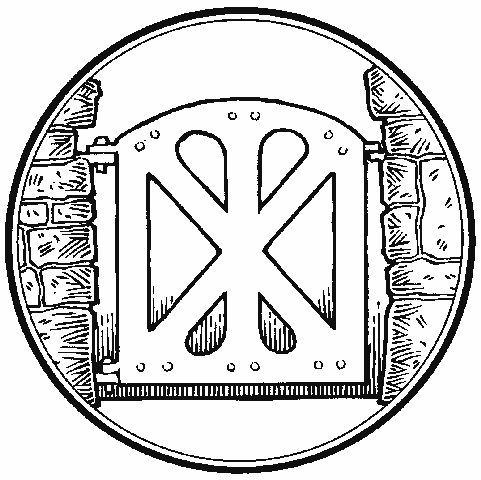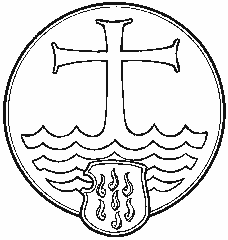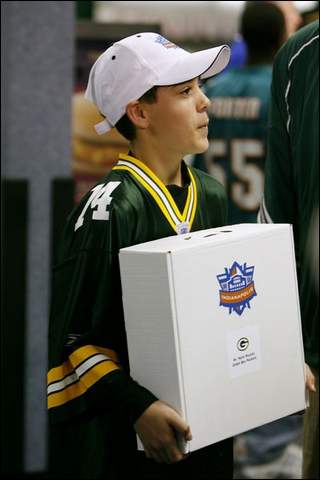 Grace, mercy, and peace to you from God our Father, and from our Lord and Savior, Jesus Christ, amen. The text for the sermon comes from the Gospel, which was read earlier.
Grace, mercy, and peace to you from God our Father, and from our Lord and Savior, Jesus Christ, amen. The text for the sermon comes from the Gospel, which was read earlier.
“You just don’t get it, do you?” “The lights are on, but nobody’s home.” “He’s not playing with a full deck.” These are just a few phrases people use to suggest that someone lacks a little something in the intelligence department.
When reading our text for today, we see that Jesus speaks in a figure of speech, “but they did not understand what he was saying to them.” All too often, we do not understand what is being said to us. However, that doesn’t change the message of the text. The words of our text are addressed to Christ’s entire audience: His disciples, the formerly blind man, the Pharisees, and the other Jews who happened to be there. The purpose of the entire parable was to point out to everyone the Pharisees’ sin of leading people astray, so that the people would avoid them, and to try to lead those same Pharisees to repentance. The entire text forms a beautiful picture of Jesus’ work for us as our Savior, being the one who truly gives us life in every sense of the word.
Jesus begins with a parable with which we are all familiar. The picture of the sheep and the Good Shepherd is used repeatedly throughout Scripture. A shepherd cares for the sheep and is willing to give his own life for the sake of the sheep. Why is that? Sheep are dumb animals. They will walk themselves off of a cliff if not watched. When a storm comes, they will cluster together, often suffocating one another because they are so close to one another. That is why sheep need a shepherd.
To be a true shepherd, there must be a certain quality about the shepherd. The shepherd is one who lays down his life for the sheep. How he approaches the sheep is also key. A shepherd enters through the gate and the sheep know who he is. One who is not the shepherd climbs in the sheep pen by another way. This is startling to the sheep and the sheep scatter.
People who enter the sheep pen by this way are thieves and robbers. They are not the shepherd, yet sneak in to the sheepfold to use the sheep to their own advantage. One avoids the door and gets in some other way. He is described as a thief, one who tries to steal something quietly, and a robber, one who steals things by force and violence. He does not own the sheep and does not really care about the sheep. The shepherd, however, uses the gate.
As we see in our text, Jesus is referring to Himself as the Shepherd. If He is the Shepherd, then we are the sheep. Jesus Christ, who is the “Lamb of God who takes away the sins of the world,” is our Shepherd. He enters by the door, speaking honestly and without concern for Himself. He is recognized by His voice, that of the Gospel. The Gospel is not about what we owe God, but of what God in Christ freely gives us: forgiveness, life, and salvation. He leads all His sheep in and out. Regardless of where we go in life or what happens to us, the Good Shepherd has gone there ahead of us and remains with us. Although the evil of this world surrounds and infects us as sinners, in his gifts Christ constantly cleanses and restores us.
As our Good Shepherd, that is what Jesus did on our behalf. He has gone on before us and has taken our place. He has taken our rightful punishment on Himself so that what is to be ours now becomes his. What is meant for us? All that is not God. What is meant for us is everlasting condemnation and all the torments of hell for our sins against God and His Word. However, Jesus took all of that from us and gave to us His holiness and righteousness so that we might receive everlasting life.
Christ is your Good Shepherd, who has laid down His life for the sheep. He has gone to the cross to redeem you from sin; He has suffered God’s judgment so that you might be His people. And so the psalm declares: “we are the people of His pasture, and the sheep of His hand.”
Your Good Shepherd has laid down His life for you, and now He has taken it up again. He is risen from the dead, and the grave could not silence Him. He declares, “My sheep hear My voice, and I know them, and they follow Me.” Today you hear His voice, for even today He speaks, and His Word does what He says. To you He cries out, “Come to me, all who labor and are heavy laden, and I will give you rest.” To you He cries out, “And behold, I am with you always, to the end of the age.” To you He cries out, “I am the resurrection and the life. Whoever believes in me, though he die, yet shall he live.” He declares this to you in His eternal Word; and by the work of His Holy Spirit, you hear His voice and follow Him. He is your rest. He is your resurrection. He is your life.
The Lamb who suffered for our sins is also the Shepherd who leads and guides us, but we also Jesus Christ, the “Lamb of God who takes away the sins of the world,” as the Shepherd who is the door.
It is through Jesus Christ and Him alone that the sheep are led to safe pasture.
Throughout the many days of our lives, there will be many a time where we will not be in safe pastures. Often, we will “walk through the valley of the shadow of death.” Without a Shepherd to guide us, there will be nothing to prevent us from the wild beasts that set out to devour us. Only our true Shepherd can protect us from all that seeks to devour us, namely, all that leads us into sin. Our sin keeps us from entering the gates of heaven. The gates of heaven were shut to you and me, and we had no hope of everlasting life – only the futility of living here apart from God before an eternity of His wrath. But now the door has opened, for Jesus has taken away your sins. You have access to the Father, who delights to hear your prayers for the sake of His Son; and you have the promise that you will live with Him in glory forever. That access to heaven is given to us because Jesus, our Good Shepherd, has gone on before us to lead us to the way of peace.
There are so many voices who call us to follow them. There are even thieves who jump the fences of our lives and forcibly attempt to make us follow them. It isn’t hard to get confused amid the swirl of so many voices: the voice of worry and fretting; the voice of sorrow; the voice of concern; the voice of fear. Voices of all kinds pound our ears and the cross becomes obscured as other forces come to play on our life, virtually drowning out the one voice that really can and will lift us above all this and sustain us with His life-giving body and blood.
Jesus closes our text with a stark contrast between the thief and Himself. The thief is only out to steal the sheep, kill the sheep and thoroughly destroy them. The sheep are not safe from him. Certainly, this is the effect false teachers and leaders have upon people. They may speak the reassuring words of a shepherd. They may even come dressed as a real shepherd. But in the end they only destroy the precious souls of people by their false teachings.
In contrast, Jesus comes to give life. That is why He laid down His life for the sheep, for you and for me, by His perfect life and innocent suffering and death. That is what He guarantees to us through His triumphant resurrection. Through His work He gives real life, which forgives sin, frees people from guilt, removes the fears and worries of everyday life, and ultimately lasts for all eternity in heaven. As Jesus says, He came so people could have life “and have it abundantly.” Jesus gives life that no one or nothing else can give. He gives us an abundance of grace, of joy, and of peace. He also gives us the ability to live for Him, free from our slavery to sin and Satan. Jesus is the life-giver in every sense of the word.
He has done all these things for you, too. He is your Good Shepherd. By His Word, He has voiced His salvation to you. He is your Door, and through Him you have come into the Kingdom of Heaven. In Jesus’ name, amen. Now the peace of God which passes all understanding, keep your hearts and minds through faith in Christ Jesus, amen.
Easter 4A 2008


